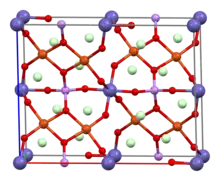Kernowite
Kernowite is a mineral which was first described in 2020. It is named for Cornwall, which in the Cornish language is Kernow.
| Kernowite | |
|---|---|
 | |
| General | |
| Category | Arsenate minerals |
| Formula (repeating unit) | Cu2Fe(AsO4)(OH)4·4H2O |
| Crystal system | Monoclinic |
Description
Kernowite is a complex arsenate mineral with the composition Cu2Fe(AsO4(OH))4·4H2O.[2] It was first described in 2020, and is closely related to liroconite, containing iron in the place of aluminium, making it green rather than blue.[3][4] Its name is derived from Kernow, the name of Cornwall in the Cornish language, after being discovered in a rock mined c.1800 in the Wheal Gorland mine, St Day, Cornwall.[3][5]
See also
- Cornwallite – a mineral also named after Cornwall
References
- P. C. Burns, R. K. Eby, F. C. Hawthorne (1991). "Refinement of the structure of liroconite, a heteropolyhedral framework oxysalt mineral". Acta Crystallogr. C. 47: 916–919. doi:10.1107/S0108270190010939.CS1 maint: uses authors parameter (link)
- "Kernowite". mindat.org. Retrieved 2020-12-24.
- "Kernowite: New mineral found on rock mined in Cornwall". BBC News. 2020-12-23. Retrieved 2020-12-23.
- "Beautiful new emerald-green mineral described from Cornwall". Natural History Museum. Retrieved 2020-12-23.
- "Kernowite: New mineral species discovered on rock mined in Cornwall 220 years ago". Sky News. Retrieved 2020-12-23.
Further reading
- Rumsey, M. S.; Welch, M. D.; Spratt, J.; Kleppe, A.; Števko, M. (15 December 2020). "Newsletter 58". Mineralogical Magazine. Cambridge University Press. doi:10.1180/mgm.2020.93.
This article is issued from Wikipedia. The text is licensed under Creative Commons - Attribution - Sharealike. Additional terms may apply for the media files.